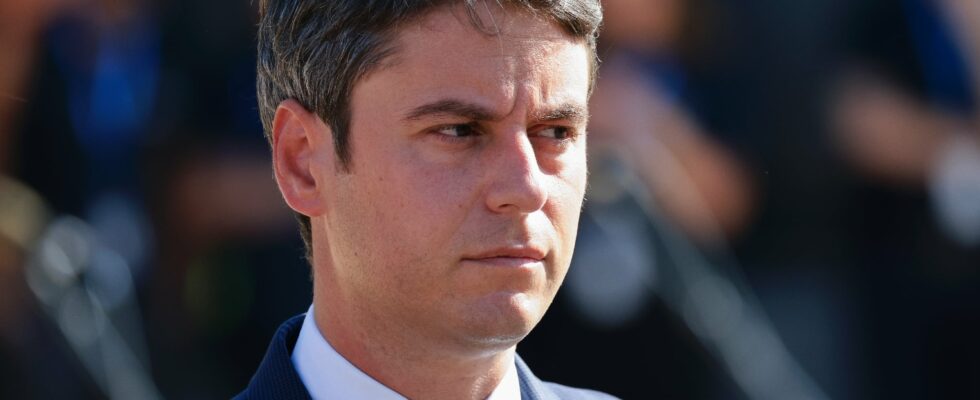Gabriel Attal marks the end of the Olympic “truce”. In a letter sent on Monday and consulted on Tuesday, August 13 by L’Express, the resigning Prime Minister and president of the Ensemble pour la République (EPR) group calls for a cross-party coalition to govern in the aftermath of the legislative elections. An “action pact” proposed to five presidents of several parliamentary groups in the Assembly: Laurent Wauquiez (Republican Right), Stéphane Lenormand (Liot), Boris Vallaud (Socialists and related), Cyrielle Chatelain (Ecologist and Social) and André Chassaigne (Democratic and Republican Left).
That is, all the opposition forces in Parliament, except three: the left-wing group La France insoumise, and the far-right groups “A Droite” (AD, led by Eric Ciotti) and Rassemblement national. An outstretched hand aimed at “overcoming” political disagreements on the basis of six or seven major themes, although it excludes more than a third of the elected representatives of the Chamber.
Broad priorities to be able to unite
To explain this call for unity, Gabriel Attal starts from the observation that “no political formation […] was not given a sufficient majority by the French to govern [seule] the country”. Faced with the absence of an absolute majority, the president of the EPR group therefore wishes to “find a new path in the National Assembly, through dialogue and overcoming the usual divisions”.
He then lists six projects described as “priority”, on the basis of which the EPR group says it is ready “to engage in discussions”: “The restoration of our public accounts and the strengthening of our economic sovereignty”, “the defense of our values, our secularism and the renewal of our institutions”, “the quality of life of the French: their purchasing power, their housing and their work”, “the environment”, “security” and “public services” with priority given to “education and health”.
In another mail consulted by BFMTV and addressed the same day to the leaders of the political parties (excluding LFI, RN and AD), the secretary general of the Renaissance party, Stéphane Séjourné, mentions a seventh project: “military sovereignty”. Themes with a fairly broad and consensual formulation, with a view to finding an echo with the left and the right.
In detail, a more divisive program
In addition to its “action pact”, the EPR group nevertheless completes each theme with proposals for measures already defended and more divisive within the political class: “reforming unemployment insurance”, establishing a “golden rule against tax increases”, “increasing minimum sentences for everyday incivility”, or even a call for “rapid application of the measures of the immigration law”.
Ensemble pour la République also wants to reassure the opposition parties. At the end of the letter, EPR says it is open “to discussing proposals” that are absent from the text. The document then lists several subjects “likely to be the subject of discussions”, ranging from a “greater hardening of penal policy” to “the taxation of undue profits or rents”. Similarly, Gabriel Attal states that it is “healthy to have disagreements and differences”, calling for them to be “overcome” rather than “erased”.
More broadly, the president of the EPR group calls for avoiding political divisions “by being confined to questions of people – the “who”, before the “what””. With this clarification, Gabriel Attal therefore seems to want to first agree on the same program before debating a common candidate to succeed him as Prime Minister. A choice that would be difficult, faced with an increasingly divided National Assembly.
A call for unity without the union of the left
To justify this call for an action pact, Gabriel Attal specifies that his group is the “second largest in number in the Assembly”, behind the National Rally and while the New Popular Front totals 193 deputies, against 166 for the presidential coalition and 142 for the extreme right.
The ability to rally behind the majority therefore looks complicated… What’s more, while Gabriel Attal has chosen to sort the left-wing forces in the Chamber. Indeed, this call to overcome political divisions is addressed to a specific part of the Assembly: “from the Republican left to the Republican right”. This formulation therefore excludes both the far right and La France Insoumise, the third largest party in the Assembly and the main party of the New Popular Front. A call that resembles the instructions to postpone votes between the two rounds and which therefore stands in the way of a hypothetical coalition with the other left-wing parties.
And for good reason: since mid-July, the New Popular Front has been defending a joint candidacy for Matignon, Lucie Castets, on the basis of her own program. She herself addressed her priorities to the deputies and senators on Monday in a letter co-signed by the seven leaders of the left-wing parliamentary groups. If Emmanuel Macron had rejected this proposal at the end of July, referring to “mid-August”, the end of the Olympic truce should force the head of state to make a decision.
